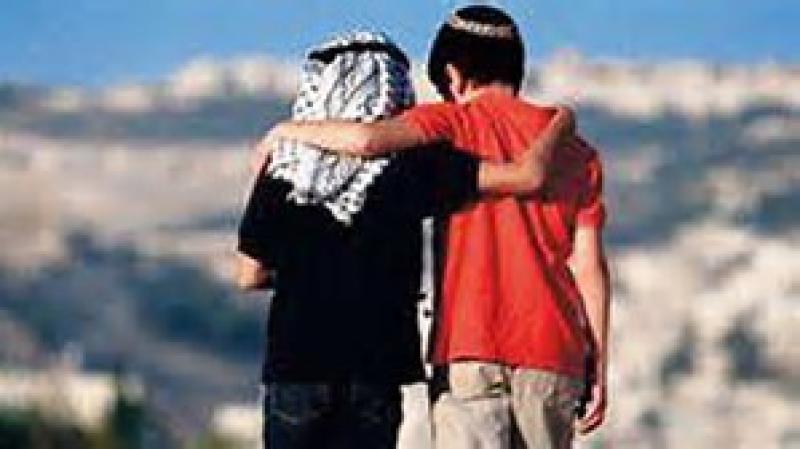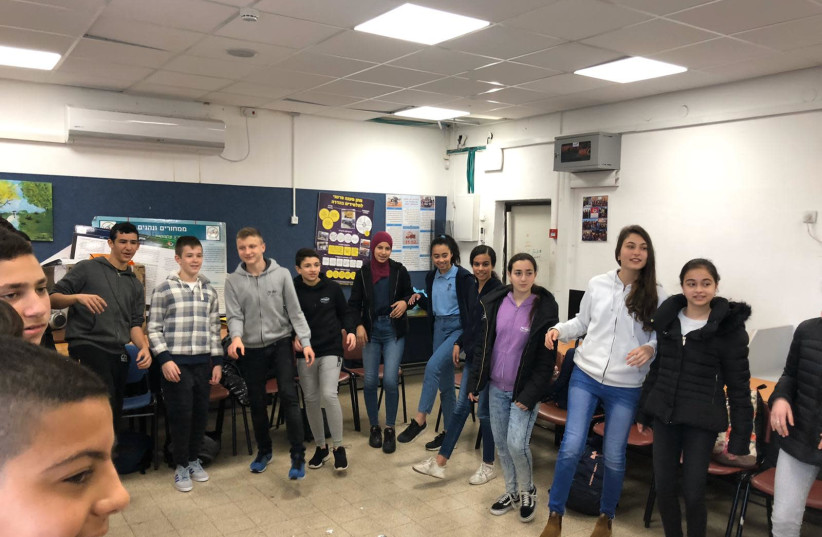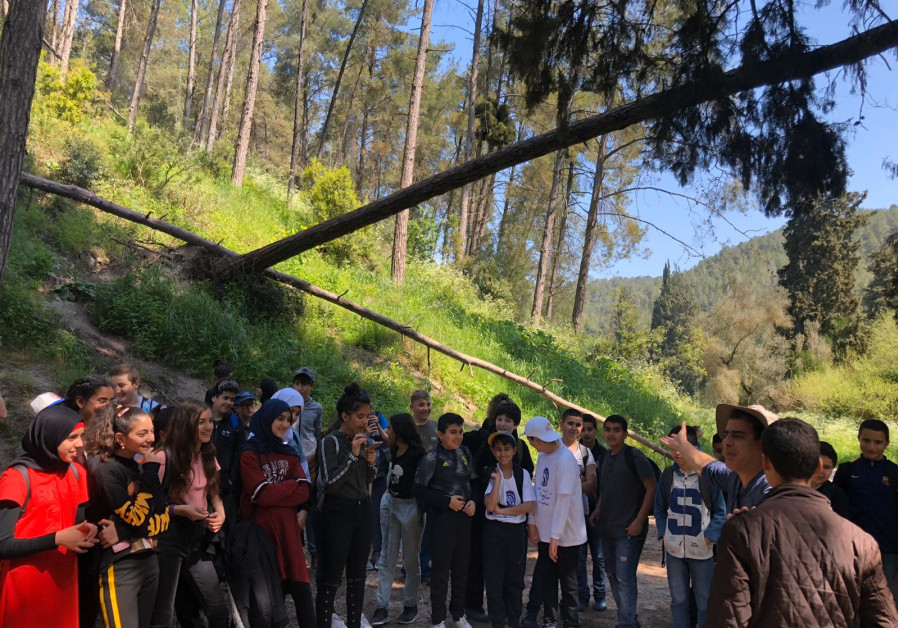Arab, Jewish shared learning program kicks off this year doubled in size

As long as the politicians stay out of it, this is the kind of program that can build normalization.

Arab, Jewish shared learning program kicks off this year doubled in size
Program teaches students English in joint classroom and builds friendships at the same time.

Students from middle schools in Nazareth and Nof Hagalil study together and create joint projects
(photo credit: Courtesy)
Arab students from the Al-Zahraa middle school in Nazareth celebrated Hanukkah with Jewish students from the Ort Yigal Alon middle school in Nof Hagalil last year, singing holiday songs, spinning dreidels and eating jelly doughnuts.
It was an unexpected sight and one that, according to Meisa Khoury, an English teacher at the Al-Zahraa school, “was very emotional.
It was very special to see the video of them celebrating together… Who would have thought it could go this far?” Khoury said.
The Hanukkah party was planned at the initiative of the middle schoolers. It took place months after Khoury’s class became involved in The Abraham Initiatives' Shared Learning program.
The pilot program launched last year. It brings together teachers and students from Jewish and Arab schools across the country to study English through a series of eight to 10 lessons, co-taught by Arab and Jewish teachers.
This year, the program, which relaunched earlier this month, has more than doubled in size, from 15 middle and high schools to 40, and from 500 students in 2018 to 1,000 today.
According to Abraham Initiatives , this is the first time in Israel that a broad and systematic language study program like Shared Learning is being implemented nationwide. The goal is to prove the feasibility and effectiveness of the model so that it may later be adopted and operated by the Education Ministry, according to a release by the NGO.
Abraham Initiatives works to ensure full and equal social and political rights for Jews and Arabs in Israel.

Arab students from Nazareth and Jewish students for Nazareth Illit take a school field trip together.
The Shared Learning program addresses the separation between Jews and Arabs in the educational system by working to reduce stereotypical thinking, prejudice and suspicion. It is based on a model developed in Northern Ireland in response to the long-standing separation of the Catholic and Protestant education systems. It has been successful in Ireland for more than a decade.
A similar version of the program has been tried in divided schools in Kosovo, Bosnia and Herzegovina, Croatia and the Republic of Macedonia, among other places.
Arabs represent around 20% of Israel’s population. But Jewish and Arab children grow up living separate lives, beginning with a divided education.
“In the Arab community, the first time they meet Hebrew speakers is in university or college,” Khoury said, “which is too late. When you start younger, integration is much more successful.”
Khoury explained that she and her counterpart at the Ort school build their curriculum together, sharing creativity and best practices. As such, she has formed a close relationship with her co-teacher, just as the students, too, have a chance to interact.
She said that the students not only learn English – a core curriculum subject – but that the content of the classes is centered on important lessons, such as respect and acceptance.
MORAIA PRIJNES, a teacher at a middle school in Kibbutz Yifat, expressed similar sentiments, though she said, “it is not easy. The students come with two different narratives. These are two different peoples living in the same country. But kids are kids, and dialogue building is crucial for understanding that we are all here in the same boat and we have to make the best of it and we have to communicate – really communicate.”
Khoury said that the kids come to the classroom for the first and second times with a lot of preconceived notions about the other. But as they start to speak to one another, they realize that they have more in common than they think, from the video games they play to the songs they listen to.
She said that she wishes the program would start earlier – as early as third grade, when most students in Israel start formally learning English – and that it would involve parents.
Prijnes, who is working with the Education Ministry on developing a multilingual education policy for Israel, said that the courses are taught in English and that the students are required to speak English to one another – putting them on equal ground, an important component of the program’s success.
“No one has an advantage over anyone else,” she said. “They are all speaking English as a second language.”
She said her research – she has a master’s degree in multilingual education – showed her that multilingualism is added value.
“Multilingualism does not hamper language learning,” she said. “It is a resource that a person can use for communicating, and the more languages they know, the more tolerant they are.”
She said she believes this kind of co-learning is the future for the State of Israel.
“This program is not going to have impact overnight,” she admitted, “but I think we are on the right track. Our country is thirsty for a less segregated society.”



That is exactly what happens at the "Seeds of Peace Camp" in Maine, where my son was a counsellor for two summers. The kids come from Palestine and Israel scared of each other, hating each other, until they have spent the session there bunked together and doing together all the usual summer camp things, and when they leave they are hugging and kissing each other and promising to write and visit each other.
Post an article about Israeli Muslims and Jews getting along and coexisting and nobody gives a shit. No sense posting anything positive about that. Obviously everyone is only interested in wars, conflicts and political and religious arguments and hatreds.